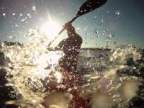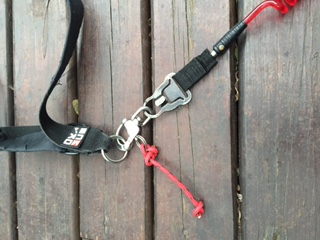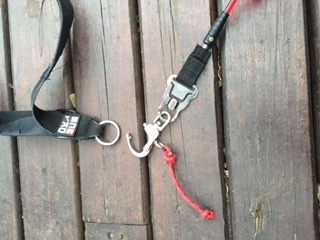- Posts: 59
- Thank you received: 7
Mind Games in Mauritius
- Colnagodreaming
- Topic Author
- Offline
- Senior Member
Essentially I was taken out by a set of big waves outside the Le Morne pass, whilst doing a group down-winder, the afternoon before the morning of the MOC race. The big wave (4m or so) caught me as it closed out, behind my ski, as I was moving up the wave (to avoid being capsized ironically).
The power of this thing breaking was awesome. The leg rope separated (a strong kite surfing leash), the ski disappeared and I lost the paddle after being dumped a second or third time. Although it was cinched tight, the pfd was nearly torn away by the white water rushing past each time. It was the best part of 2 hrs to get to shore, during which there was no guarantee i would make it. Unnerving.
We had started the run accompanied by a safety boat, and in a group. None of them saw me go down and none saw me over the next 2 hrs or so, as I fought to get back to land. Two hrs can seem a VERY LONG TIME, when you don't seem to be making any progress. Sobering.
Points of recollection; just how easy it is to say "don't panic" and how hard it can be to think dispassionately when being repeatedly held under for longish periods. Just how sobering it can be when you realize you have a limited time before night falls, or your energy runs out or you inhale water. Throw in currents, and tides slowing you reaching land, and a channel current pulling you away from the coast and you have a whole host of demons attacking your sanity. The mind becomes a battlefield as the cognitive part says don't panic, and the emotional part screams the urgency of the situation.
What were my take home points? Probably nothing new, but things that might have eased the loneliness a little;
1. Know its going to be hard.
Surprising just how powerful the negative emotions can be - they suck your strength, particularly when the options seem to be running out or not working. It took some time to realise i had to make ground under my own steam, that none of the other paddlers, kite boarders, wind surfers, or safety boat could see me. Effectively I was on my own. I had to deal with the heartbreak of not seeing land come closer, not being seen and knowing my resources were waning. I had to keep thoughts of my wife and kids out of my head-it only hurt and sapped the focus. I tried not to think of Ken Feathers.
Its one thing to know how to swim, its another thing entirely to stay afloat and alive, especially when you know there is a possibility you might NOT make it. It was very easy to see how people drown - it starts in the mind.
2. Cinch up that pfd as tight as tolerable - too damn easy to have it ripped off by strong waves. I now understand why victims drowned at deep sea are often found naked. The current/wash really can be that strong.
3. Have a loud whistle at hand. Cheap, easy, light. Not going to save you if no help is around, but why drown if there are ears nearby. I now like the SAFFA trick of having a cell phone in a waterproof case (just make sure it doesn't get ripped out of the pfd by the water). Epirb not a bad idea either.
4. Consider a paddle leash. I'm mourning the loss of my paddle after having lost it on the third time the white stuff got me. I dont like paddling with a paddle leash, however, had I the wit (and leash) I might have tied the paddle behind me as I swam to shore.
Another arguement for a paddle leash joining paddle and ski, I heard, was that one can swim to the ski (and leashed paddle) if you both hands free to move. This one is debateable, but after my experience, Im listening for all the one percenters out there.
Good trick
5. Get as fit as you can. It impressed me how pathetically weak I felt in the water. I would take a few strokes, get worn out and then float with my head in the water. Even shouting for help was tiring (and in my case, futile). Swimming with a pfd is a b....., try it sometime (but it keeps the head underwater)
6. Have a couple of pfds to paddle with. In big swell go for the higher rating pfd. The one I was using, was fairly rated as level 50- ( use in sheltered swimming, with help nearby) and velcro pockets. Needless to say, everything was ripped out of the pockets by the white water.
7. Learn as much from the surf lifesaving guys as you can. They've all been there. They have little tricks for dealing with capsized skis, hanging on to the ski and/or footstraps etc. Another is to grasp the leg rope as the ski pulls away, in order to lessen the force on the leash. Very difficult when a king wave hits, but might help in smaller swell.
8. Paddle with other guys. Obvious?? Think how often you have started in a group and eventually separated over a long downwinder. Throw in some swell and you may or may not see another paddler. If one person capsizes, or loses their ski, you won't necassarily be seen
9. Respect the ocean. Easy to say. Amazing though, just how fast and badly things can deteriorate. Isn't that power one of the reasons we love the sea? One of my personal rules is wariness when currents or swell are moving offshore. And finally, for those who believe, pray. And be thankful.
Please Log in or Create an account to join the conversation.
- MCImes
- Visitor
As a side thought, do you think this experience affected your race the next day? Being alone in the open ocean isnt a great place to be and I can see how that would be extremely taxing mentally.
1 last question (to everyone): I hear about leashes breaking in large conditions, when they are needed most. Is there anything one can do to lessen the chances of their leash breaking? Obviously strong attachment points to the boat and body, but are there other factors we may not normally think of?
Again, glad you made it in.
Please Log in or Create an account to join the conversation.
- AR_convert
-

- Offline
- Platinum Member
- Brett McDonald previous forum name :Pilbaralad
- Posts: 1070
- Thank you received: 138
MCImes wrote: I hear about leashes breaking in large conditions, when they are needed most. Is there anything one can do to lessen the chances of their leash breaking? Obviously strong attachment points to the boat and body, but are there other factors we may not normally think of?
Again, glad you made it in.
Leashes are not designed to take the load placed on them in breaking surf and if they were, you wouldn't want the weak point to be your hip/knee joint
In fact most suggest unclipping your leash before coming in through a surf zone.
They are to keep you in touch with your ski in the open ocean/downwinds where you fall out and the wind may catch your ski and try to roll it away.
The best solution for surf ( if that where you really want to be in an ocean ski) is what wave skiiers use, a good paddle leash, that way when you seperate from your ski you can keep in touch with it by holding onto you paddle.
Always looking for the next boat
Please Log in or Create an account to join the conversation.
- [email protected]
-

- Offline
- Admin
- Posts: 1839
- Thank you received: 411
Funny - I had an experience in more or less the same spot but in much, much smaller conditions. Epic Kayaks had a launch/test session for the V12 in Mauritius and a couple of us were invited up there to cover the event. The one day Greg Barton and I paddled together from Tamassa to Le Morne. The swell was small - so small in fact that it was hardly breaking on the reef. Neither of us knew exactly where the entrance was at Le Morne and eventually Greg just turned right and went over the reef. I figured, well I'm not staying out here, so I followed him - and of course a little set came in at the same time. The water sucked off the reef, and I thought I was going to be the first person ever to break a V12.
Stuck my legs out and just managed to avoid the exposed coral, but I came off as the wave broke. Next thing I was standing on the coral in thigh deep water - and the next wave arrived. This one pulled the boat away from me, hard. I was wearing a leg leash - and it didn't break, rather wrenching my knee in an excruciating fashion and I spent the rest of the trip limping.
Since then I've worn a belt leash. I've installed a quick release snap shackle at the belt end and always release the leash before I go through surf.
Now it's on:
One yank and it's off:
Of course I'm only going to release the leash if I'm near the shore. If I were to be taken out in the deep, I'd want the leash to hold. Unless of course the wave was so big that I'd be injured if I stayed attached to the boat.
I also use a paddle leash - but I strongly feel that the paddle should be leashed to the boat, not the paddler! If you've lost your boat, the paddle is not much use (except for waving to rescuers), especially if you've got to swim.
I carry a radio - and used to carry a mobile phone in a pouch until it got stolen. I MUST get another cheapy one.
Paddling in Mauritius I always carried my phone, not sure how extensive the radio coverage is and in any case some countries don't like you having a radio, not sure what the rules are in Mauritius.
Really glad you made it!
Rob
Currently Epic V10 Elite, Epic V10 Double.
Previously: Swordfish S, Evo II, Carbonology Zest, Fenn Swordfish, Epic V10, Fenn Elite, Red7 Surf70 Pro, Epic V10 Sport, Genius Blu, Kayak Centre Zeplin, Fenn Mako6, Custom Kayaks ICON, Brian's Kayaks Molokai, Brian's Kayaks Wedge and several others...
Please Log in or Create an account to join the conversation.
- Colnagodreaming
- Topic Author
- Offline
- Senior Member
- Posts: 59
- Thank you received: 7
Im very grateful to those many (esp. the SA ladies) at the boatshed who provided support to her whilst i was missing at sea. Its a subject close to their hearts.
But hey, definitely looking forward to another Mauritius in the future
Please Log in or Create an account to join the conversation.
- zachhandler
-

- Offline
- Platinum Member
- Posts: 796
- Thank you received: 200
From what I have observed, most paddlers that downwind in a group really aren't doing so in a way that increases safety. It's not that they don't care about each other, or wouldn't stop if they saw one of their mates go take a swim. It is simply everyone is doing their own thing chasing waves, and most capsizes are not witnessed by other paddlers. What then happens is some guy doesnt show up at the take out spot, and after a few rounds of beer people start to worry.
I think for group paddling to increase safety, there has to be a deliberate plan to ensure that nobody ends up alone and unwitnessed in the water. "Everyone keep an eye on everyone else" does not work because with that strategy nobody is accounting for who could be missing. "Everyone keep an eye on everyone else" is the same as having no plan.
A better plan is a buddy system, where groups of 2 or possibly 3 paddles of similar speed pair together and keep a constant eye on each other. Constant means every minute looking for your partner, and if you cant see them after looking in all directions, then turn and seach for them.
Another, though probably less good option, is not to pair up, but rather pause every 10 minutes to ensure that all boats are acounted for. The fastest paddler has to initiate the rendevous and wait for the others. If some paddler does not show up, then everone starts punching upwind looking for ski and paddler. This strategy does require frequent breaks in paddling, which is good or bad depending on you fitness. It also requires the lead paddler realizing that they are in the lead and taking a break. If they think they are chasing someone, they will simply keep paddling and there will be no rendevous.
Is it adequate so simply ensure everyone has a VHF or phone securely attached to their PFD? I think that depends on a number of things. Rescue will be much quicker if there is another paddler there to witnes the accident and either perform the rescue, or at least stay with the swimmer to give the rescue craft a visible target. If the potential search area is large, if currents are strong, if the route is far from shore, if water is cold, and if it is an area without an abundance of search and rescue outfits, then it really makes sense to use the buddy or group system IN ADDITION to having a phone or VHF.
Maybe this seems like overkills to people from warm popular coastlines with established search and rescue organizations. Where I am the water is cold and you are basically on your own out there, so this is the perspective I have come to.
Current Skis: Nelo Vanquish AIR, Epic V10g4, NK 670 double, NK exrcize, Carbonology Feather, Think Jet, Knysna Sonic X
Former Skis: Epic v10g3, Kai Waa Vega, Epic V12 g2, Epic V12 g1, Epic v10 double, Nelo 550 g2, Fenn Elite S, Custom Kayaks Synergy
Please Log in or Create an account to join the conversation.
- barrypaddle1
- Offline
- Junior Member
- Posts: 37
- Thank you received: 3
Please Log in or Create an account to join the conversation.
- AR_convert
-

- Offline
- Platinum Member
- Brett McDonald previous forum name :Pilbaralad
- Posts: 1070
- Thank you received: 138
I would think the race director/organizers will learn from this as well.
Always looking for the next boat
Please Log in or Create an account to join the conversation.
- Col Campbell
- Offline
- Junior Member
- Posts: 28
- Thank you received: 1
If it was not for Brendan (I am pretty sure it was Brendan) being sure there was a #15 ski out there at the start & a few km before the pass no one would have known you were missing/potentially missing.
There was also a group who must have caught a taxi & left earlier and it was also a thought that you might have been with this group as there were more skis on the trailer than paddlers at the bus, this also was a factor in not knowing who & if anyone was missing/potentially missing.
It goes to show you really need someone to paddle with who can confirm you where on the water & are missing. There was quite a bit of confusion abut who & if anyone was missing which took far to long to determine that there was an issue on the day.
Glad to hear you made it out OK, I got dumped in the pass a couple of days earlier & had a leash break, but luckily my ski must have been in a back current & I was able to find it without to much drama & only swan for around 5 min.
Please Log in or Create an account to join the conversation.
- Colnagodreaming
- Topic Author
- Offline
- Senior Member
- Posts: 59
- Thank you received: 7
Very good point mate
No, as it turns out my ski was not counted when we left Tamassa. Another Rule- make sure you are counted prior to putting boat in water. Never presume someone is taking down the numbers; make sure you have told then and closed the loop of communication.
Thanks
Please Log in or Create an account to join the conversation.
Glad you made it back ok.
A mate of mine put me onto this. I'm looking into one of these at the moment. As well as being an EPIRB it also has a display with your gps coordinates and a VHF radio built in.
www.nautiluslifeline.com
Might be worth looking into as they work worldwide
Please Log in or Create an account to join the conversation.
Bigdog wrote: Hey Guys
Glad you made it back ok.
A mate of mine put me onto this. I'm looking into one of these at the moment. As well as being an EPIRB it also has a display with your gps coordinates and a VHF radio built in.
www.nautiluslifeline.com
Might be worth looking into as they work worldwide
Take a closer look. It's not an EPIRB but a low wattage VHF radio with a DCS function. There is no communication other than a one way GPS receiver and radio. It's a standard VHF radio with DCS except it has a waterproof housing and even less function as most handhelds with DCS. As far as I know the U.S. Has near full DCS coverage but many other country do not. It only works with other radios in the DCS mode with other radios with the same fiction or with the coastguard and only if your in range of a repeater.. It's a great safety upgrade especially in the U.S. and this is a nice little unit, but do not mistake it for a EPIRB.... That is a different creature.
FENN Bluefin S
FENN Swordfish S carbon hybrid
Epic V8 double gen 2
Lot and lots of DK rudders.
Had:
Stellar SEL excel (gen 2)
Stellar SR excel (gen2)
Stellar S18s g1 (excel)
Epic V10 Double (performance)
Stellar SR (gen 1)
V10 sport (gen 2)
V10 (Gen 2)
Beater SEL (gen 1)
Please Log in or Create an account to join the conversation.
I think I'll stick with my current EPIRB
Please Log in or Create an account to join the conversation.
Latest Forum Topics
-
- Nelo models getting confusing
- 9 hours 18 minutes ago
-
- Surfski Width x Length Chart - Sept. 2017
- 2 days 17 hours ago
-
- Debrito bailer gasket replacement
- 5 days 19 hours ago



